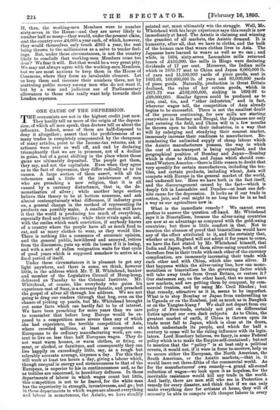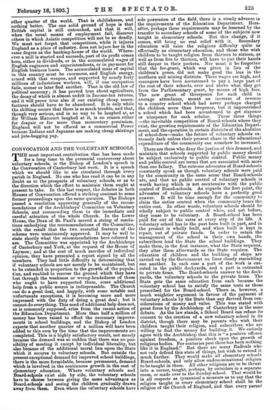ONE CAUSE OF THE DEPRESSION. T HE economists are not in
the highest credit just now. They hardly tell us more of the origin of the depres- sion, of which all men speak, than doctors tell us about the influenza. Indeed, some of them are half-disposed to deny it altogether ; assert that the profitlessness of so many trades is completely compensated by the cheapness of many articles, point to the Income-tax returns, ask if artisans were ever so well off, and end by declaring triumphantly that we are in presence, not of a decline in gains, but of a great shifting in the place where those gains are ultimately deposited. The people get them, they say, and not the capitalists. Even when they agree as to the fact of depression, they differ radically as to its causes. A large section of them assert, with all the vehemence and a little of the intolerance of men who are preaching a new religion, that it is all caused by a currency disturbance, that is, the de- monetisation of silver ; while another large section believe this theory to be at bottom nonsense, and ask almost contemptuously what difference, if industry goes on, a general change in the method of representing its products can possibly make. A smaller section will have it that the world is producing too much of everything, especially food and textiles ; while their rivals again ask, with the smiles which mark conviction, if anybody knows of a country where the people have all as much food to eat, and as many clothes to wear, as they would like. There is nothing like a consensus of economic opinion, and the general public, bewildered and annoyed, retires from the discussion, puts up with its losses if it is losing, and with a sort of sullen resignation waits for that cycle of good years which is supposed somehow to arrive at a fixed period of itself.
Under these circumstances it is pleasant to get any light anywhere, and there is some, we think, however little, in the address which Mr. T. H. Whitehead, banker and member of the Legislative Council of Hong-kong, delivered on Tuesday to the Colonial Institute. Mr. Whitehead, of course, like everybody who gains his experience east of Suez, is a currency fanatic, and preached the gospel of silver all through his address. We are not going to drag our readers through that bog, even on the chance of picking up pearls, but Mr. Whitehead brought out some facts which can hardly fail to be of interest. We have been preaching for more years than we care to remember that before long Europe would be ex- posed to a competition more severe than any of which she had experience, the terrible competition of Asia, where crowded millions, at least as competent as Europeans to do ordinary manufacturing work, are con- tent to live on less than half European wages. They do not want warm houses, or warm clothes, or firing, or meat, or alcohol, or furniture, and consequently they can live happily on exceedingly little, say, as a rough but tolerably accurate average, sixpence a day. For this they will work at least ten hours a day, giving a labour which, though unequal in energy and strenuousness to that of the European, is superior to his in continuousness and, as far as textiles are concerned, in hereditary deftness. In those departments of labour in which wages count but little, this competition is not to be feared, for the white man has the superiority in strength, inventiveness, and go ; but in those departments in which wages are almost everything and labour is monotonous, the Asiatic, we have steadily pointed out, must ultimately win the struggle. Well, Mr. Whitehead with his large experience says this result is now immediately at hand. The Asiatic is claiming and winning the grandest of all markets, the Asiatic demand. It is humanity, after all, that we have to clothe, and the bulk of the human race that wears clothes lives in Asia. The Japanese have learned to weave as well as we can ; and while, in 1894, sixty-seven Lancashire mills returned losses of £410,000, the mills in Hiogo were declaring dividends of 17 per cent. Moreover, the Indian mills which in 1876-77 sent to China and Japan 8,000,000 lb. of yarn and 15,500,000 yards of piece goods, sent in 1892-93, 189,000,000 lb. of yarn and 80,000,000 yards of piece goods. Naturally, production in Great Britain declined, the value of her cotton goods, which in 1871-73 was £102,000,000, sinking in 1892-93 to £89,000,000. Similar figures could be produced as to jute, coal, tin, and "other industries," and in fact, wherever wages tell, the competition of Asia already begins to be successful. There is not the smallest doubt of the process continuing, for new mills are starting everywhere in Bombay and Bengal, the Japanese are only just entering the field, and China will in a few months be thrown open to both their industries, in a way that will by enlarging and steadying their nearest market, immensely increase their readiness to manufacture. Re- membering the unlimited supply of cheap labour which the Asiatic manufacturers possess, the way in which the cost of sea-transport is being equalised, and the geographical position of Bombay and Japan—Bombay which is close to Africa, and Japan which should com- mand Western America—there is little reason to doubt that very speedily for certain manufactures, including the tex- tiles, and certain products, including wheat, Asia will compete with Europe in the general market of the world, and undersell her. Here we have both in the fact itself, and the discouragement caused by the fact—which is deeply felt in Lancashire and Dundee—at least one defi- nite cause for the depression. It looks as if our trade in cotton, jute, and coal might in no long time be in as bad a way as our agriculture now is.
What is the immediate remedy ? We cannot even profess to answer the question off-hand. Mr. Whitehead says it is Bimetallism, because the silver-using countries are now at an advantage as compared with the gold-using countries ; but there is little comfort in that. Not to mention the absence of proof that bimetallism would have any of the effect attributed to it, and the certainty that, whether or no, England will not adopt it for years to come, we have the fact stated by Mr. Whitehead himself, that India and Japan, both of them silver-using countries, and therefore free in their trade with each other of the currency complication, are immensely increasing their trade with each other and with China, which also uses silver. If that happens within the silver-using line, how can mono- metallism or bimetallism be the governing factor which will take away trade from Great Britain, or restore it ? Our statesmen say, on the other hand, that we must have new markets, and are getting them by conquest, by com- mercial treaties, and by using Mr. Cecil Rhodes ; but that remedy, attractive as it is, seems to be imperfect. What is to stop Bombay or Japan from underselling us in Uganda or on the Zambesi, just as much as in Bangkok or on the Yangtse-kiang ? We shall not depart from our policy of Free-trade, certainly not put on differential duties against our own dark subjects. As to China, the greatest market of earth, if China is thrown open its trade must fall to Japan, which is close at its doors, which understands its people, and which for half a century to come will be the ruling influence with its legis- lators. Lord Rosebery believes, we fancy, in some Federal policy which is to make the Empire self-contained ; but not to mention that the "policy" is at best only a political reverie, it would not, if it were in force to-morrow, help us to secure either the European, the North American, the South American, or the Asiatic markets,—that is, it would leave out three-fifths of the commercial world. As for the manufacturers' own remedy—a grand all-round reduction of wages—we look upon it as hopeless, for the inevitable resistance would kill any trade in the world. And lastly, there are men still who see in Protection a remedy for every disaster, and think that if we can only make everything dear for artisans at home, they will of necessity be able to compete with cheaper labour in every other quarter of the world. That is childishness, and nothing better. The one solid ground of hope is that British capital is still untouched, and that it will, when the usual means of employment fail, discover others in which Asiatic competition will not be so deadly. We must not forget that competition, while it injures England as a place of industry, does not injure her in the same degree as the banking-house of the world. Where- ever a mill is started and succeeds, part of its profit comes here, either in dividends, or in the accumulated wages of English engineers and superintendents, or in payment for English business loans. The accumulated mass of capital in this country must be enormous, and English energy, armed with that weapon, and supported by nearly forty millions of industrious workers, will, if one occupation fails, sooner or later find another. That is the old law of political economy ; it has proved true about agriculture, the decay of which is almost unfelt in Income-tax returns, and it will prove true also if our existing cheap manu- factures should have to be abandoned. It is only while the shifting occurs that there is so much trouble, and that, though very serious, and in no way to be laughed at, as Sir William Harcourt laughed at it, is no reason either for despair or for more than momentary pessimism. England will not be effaced as a commercial Power because Indians and Japanese are making cheap shirtings and jute-bagging pay.



































 Previous page
Previous page